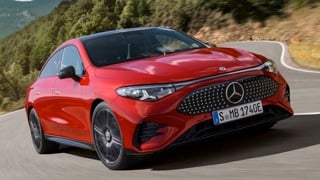Review
One of the biggest changes to be announced at the recent launch of the facelifted Audi A4 was the transition of its S4 performance model to a diesel powertrain.
Audi is switching all its S models to diesel, despite the declining interest in the fuel.
While it may seem like a backwards step, the strategy is actually quite clever and is part of Audi’s message that diesel is not dead.

For fleets, the £47,000 S4 may tempt drivers away from taking the cash option and remaining in the company car scheme. CO2 emissions of 160g/km mean it falls into the highest benefit-in-kind tax band, with 40% taxpayers facing bills of £580 per month – that’s about the same as it costs to lease one.
But drivers are still at an advantage once they consider insurance and running costs. The 3.0-litre V6 diesel engine is fitted with 48v mild-hybrid technology, helping to keep fuel consumption and emissions to a minimum by enabling prolonged engine-off coasting.
Our test saw an average of 42mpg, impressive considering the pace achieved from the 350PS powertrain.
The sedate-looking S4 only gives a few clues to passers-by that it is something special. Inside, sports seats upgrade the regular A4's interior - othewise it's business-as-usual.

The car is restrained on the motorway, making effortless progress. Acceleration is almost instantaneous, with a huge 700Nm torque surge. Even the engine note has been tuned to give a more petrol-like growl. All-wheel drive ensures the S4 always feels planted and pin-sharp steering and brakes mean it delivers great driver thrills.
Drivers can switch between Efficiency, Comfort and Dynamic driving modes, each changing the character of the S4 distinctly.
For businesses where employee retention is an important element of its company car scheme, the S4 will satisfy drivers without exorbitant fuel costs.
Matt has been an automotive journalist for nine years and has driven just about every new car and van that's on sale. As content editor - vehicles he is responsible for the automotive content on Fleet News and also contributes to Automotive Management. Prior to this, Matt worked in the automotive industry for 10 years.


Specs
| Manufacturer | Audi |
| Model | A4 |
| Specification | A4 S4 Saloon quattro 3.0TDI V6 347 SS Tp8 20MY |
| Model Year | 0.00 |
| Annual VED (Road tax) | £0 |
| BIK List Price | £47,090 |
| CO2 | 181g/km |
| BIK Percentage | 37% |
| Insurance Group | N/A |
| CC | N/A |
| Fuel Type | Diesel |
| Vehicle Type | Premium family car |
| Luggage capacity (Seats up) | 5litres |
Running Costs
| P11D | £47,090 |
| Insurance group | N/A |
| Fuel Type | Diesel |
| Cost per mile | 139.26ppm |
| Fuel | 14.40ppm |
| Depreciation | 121.20ppm |
| Service maintenance and repair | 3.66ppm |
Rivals
Info at a glance
-
P11D Price
£47,090
-
MPG
40.9 (WLTP) -
CO2 Emissions
181g/km -
BIK %
37% -
Running cost
3 Year 60k : N/A 4 Year 80k : N/A -
Fuel Type
Diesel











 Diesel
Diesel























rosco7 - 09/03/2020 14:19
Whilst Audi may not want to believe diesel is dead, the SMMT new car numbers reported monthly suggest otherwise, at least in the UK. 20% of new car orders are now diesel. And as a company car with CO2 emissions of 160g/km, this car is not going to attract company car drivers. And actually the fuel type (other than full electric) is largely irrelevant. The BiK tax of £580 per month needs to be added to the potential car allowance. Most drivers will only opt not to take the company car if they have that option. I would estimate that most employees eligable for this car will have a car allowance option of between £6k and £12k per annum. So my calculator suggests at the lower end a driver would have another £250 to £500 per month more which makes the total available per month £810 - £1060 per month after tax. For that money, even a fairly high mileage driver could do better. As much as Audi will try to convince governments and regulators of how clean the new diesels are, I don't know many people willing to risk the huge depreciation these vehicles may suffer. A 3 year 10k miles per annum without maintenance is going to be in the region of £750 - £900 per month on a personal contract. This reflects the residual risk the leasing companies are predicting.